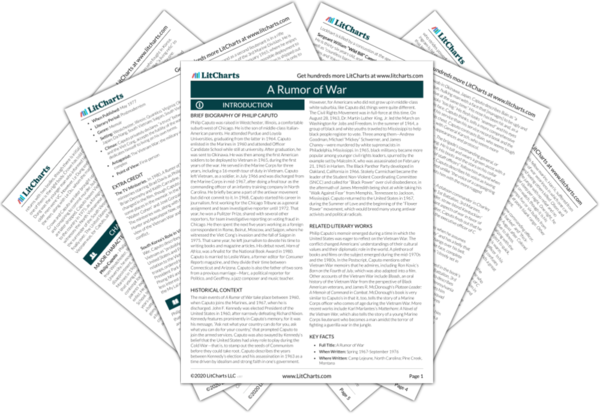Heroism and Identity
In A Rumor of War, Philip Caputo recalls how the United States’ political ambitions during the Cold War and the idealism of John F. Kennedy’s presidency fostered the belief among teens and young adults that they played a particularly vital role in determining the nation’s political future and legacy. That legacy was defined by a commitment to spread democracy throughout the world and stamp out Communism. Caputo reminisces about how he and his fellow…
read analysis of Heroism and IdentityThe Morality of War
In his memoir, Philip Caputo explores the question of when it is justifiable to kill. This question is complicated by the fact that the U.S. Marines initially enter Da Nang, South Vietnam to provide security and defense for the ARVN and are not present to engage in battle. When the role of the Americans quickly changes to that of combat, the shift in expectations leaves everyone with a vague understanding of their purpose, which is…
read analysis of The Morality of WarLoyalty and Camaraderie
Beginning with his fantasy of the Marine Corps as they relate to “Beowulf’s warriors,” Philip Caputo expresses a vision of life in the Marines as one that would reinforce male bonds. Part of this desire is likely due to Caputo’s feeling of rootlessness in his youth—belonging neither to Westchester, Illinois nor to collegiate life. The enforced brotherhood between marines, which brings together young men of different races and backgrounds, provides Caputo with connection. This loyalty…
read analysis of Loyalty and Camaraderie
Danger and Uncertainty
In A Rumor of War, Philip Caputo describes both the pleasure and pain of war’s many dangers. In relaying his experiences as a lieutenant in the Vietnam War, Caputo depicts the fears that can overwhelm a soldier on the battlefield, as well as the heroic feeling that some soldiers develop in response to their combat roles. Just as Caputo illustrates how war is morally ambiguous, he also shows how the experience of being a…
read analysis of Danger and UncertaintyWar and Disillusionment
Philip Caputo’s increasing anger over the apparent futility of the Vietnam War leads to his eventual disillusionment with the war effort and his purpose there. This disillusionment begins when he is reassigned as an assistant adjutant, or “the officer in charge of the dead” at regimental headquarters. This responsibility forces him to confront for the first time the war’s staggering human cost, which affects both sides. When Caputo is next reassigned to his rifle…
read analysis of War and Disillusionment






